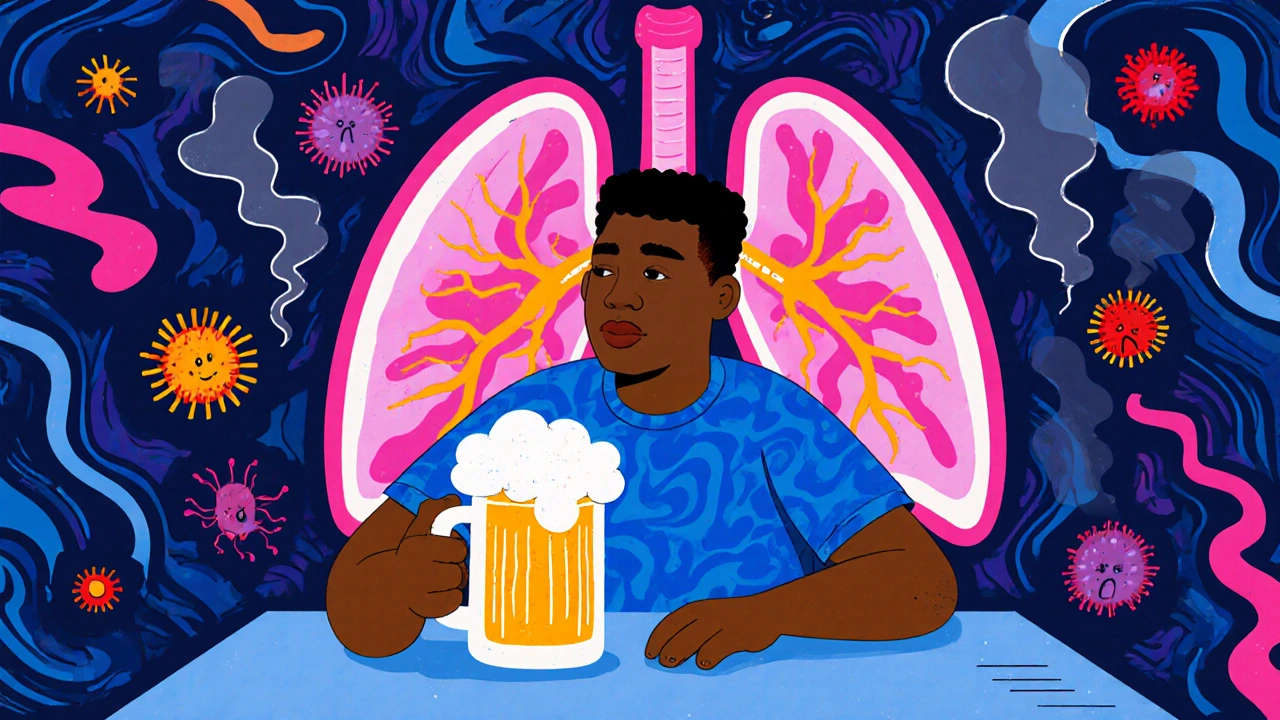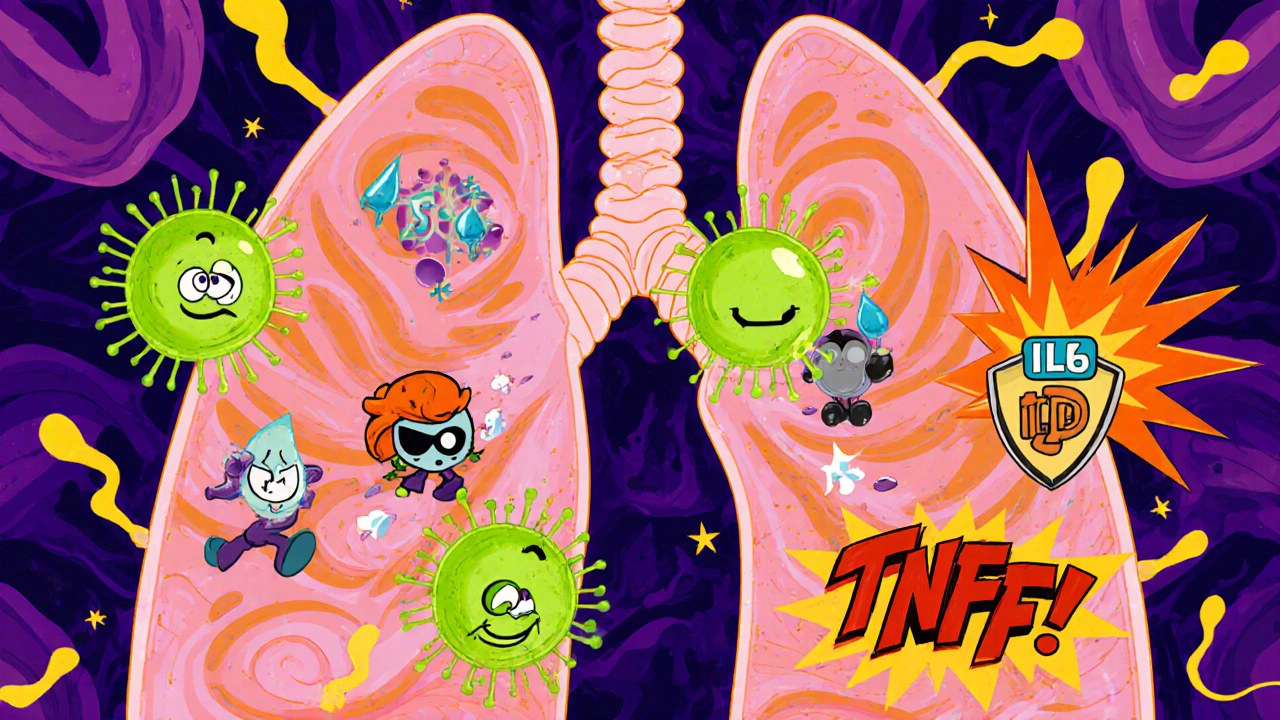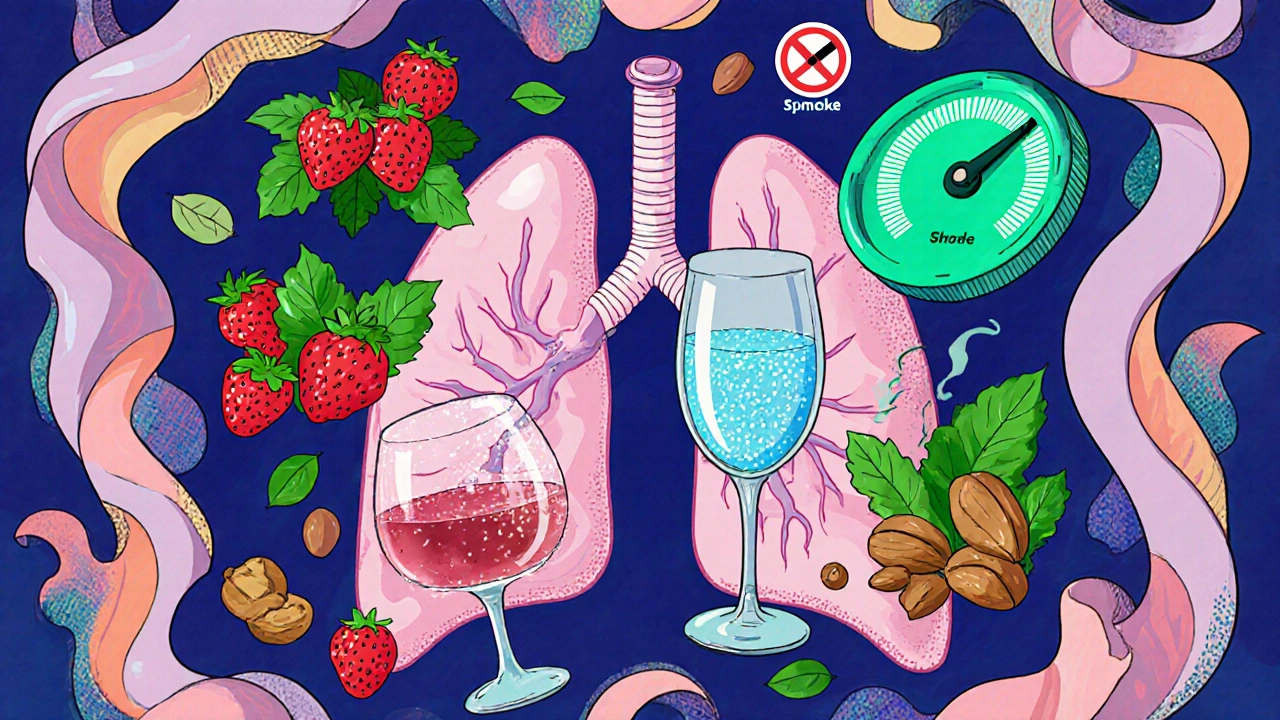How Alcohol Consumption Affects Lung Inflammation

Lung Inflammation Risk Calculator
How Your Drinking Affects Lung Health
This tool estimates your risk of increased lung inflammation based on your alcohol consumption patterns and other health factors mentioned in the article.
Calculate Your Risk
Estimated Lung Inflammation Risk
Recommendations for You
Ever wonder why a night of heavy drinking can leave you coughing the next morning? It’s not just the irritation of the throat - alcohol can actually stir up inflammation deep in your lungs. In this article we break down the science, point out the biggest risks, and give you practical steps to keep your lungs breathing easy.
Key Takeaways
- Alcohol disrupts alveolar macrophage function, making the lung more vulnerable to infection.
- Metabolic by‑products like acetaldehyde trigger oxidative stress that fuels cytokine release.
- People with pre‑existing conditions such as COPD or who smoke face a compounded risk.
- Moderate drinking (up to one drink per day for women, two for men) shows minimal impact, but binge patterns sharply raise inflammation markers.
- Hydration, antioxidant‑rich foods, and limiting alcohol on bad‑air‑quality days can blunt the inflammatory response.
Understanding Lung Inflammation
Lung inflammation is the body's immune reaction to irritants, infections, or injury within the pulmonary tissue and is characterized by swelling, excess mucus, and narrowed airways. The primary players are alveolar macrophages, neutrophils, and a cascade of signaling proteins called cytokines (e.g., IL‑6, TNF‑α). When inflammation becomes chronic, it can progress to diseases such as chronic obstructive pulmonary disease (COPD) or acute respiratory distress syndrome (ARDS).
How Alcohol Affects the Respiratory System
Alcohol consumption the intake of ethanol‑containing beverages such as beer, wine, and spirits does more than hit the liver. Ethanol travels through the bloodstream and reaches the tiny air sacs (alveoli) where gas exchange occurs. Here it interferes with the immune surveillance that normally keeps the lungs clean.
One of the first hits is on the alcohol and lung inflammation pathway: ethanol is metabolized into acetaldehyde, a toxic compound that harms cell membranes and generates free radicals. Those free radicals ignite oxidative stress, a condition where the body’s antioxidant defenses are overwhelmed.

Biological Pathways Linking Alcohol to Lung Inflammation
Several interlocking mechanisms explain why drinking can aggravate lung inflammation.
- Alveolar macrophage dysfunction: Alcohol impairs the ability of macrophages to engulf bacteria and clear debris, reducing the first line of defense.
- Cytokine surge: Acetaldehyde and oxidative stress activate the NF‑κB pathway, prompting cells to release pro‑inflammatory cytokines like IL‑6 and TNF‑α.
- Oxidative stress amplification: Reactive oxygen species (ROS) damage alveolar epithelial cells, making them leak fluid and attract more immune cells.
- Barrier breakdown: Tight‑junction proteins that keep the alveolar wall sealed become disordered, allowing pollutants and pathogens easier entry.
These changes create a feedback loop: more inflammation leads to more ROS, which further disables immune cells.
Clinical Evidence: What Studies Show
Researchers have measured inflammatory markers in both healthy volunteers and patients with lung disease. Below is a snapshot of recent findings.
| Study | Population | Alcohol Pattern | Inflammatory Marker Change | Clinical Outcome |
|---|---|---|---|---|
| Smith 2022 | 50 healthy adults | Binge (5+ drinks/occasion) | IL‑6 ↑ 45 % | Transient cough, reduced FEV1 |
| Lee 2023 | 120 COPD patients | Moderate daily | TNF‑α ↑ 20 % | Exacerbation frequency ↑ 1.3× |
| García 2024 | 75 ARDS survivors | None vs. occasional | Oxidative stress markers ↓ 30 % (none group) | Ventilator days ↓ 2 days (none group) |
Across these studies, the common thread is a measurable rise in cytokines and oxidative markers after alcohol exposure, which correlates with worsened lung function.

Risk Factors and Interactions
Alcohol rarely acts alone. Several co‑variables amplify its impact:
- Smoking: The combination of ethanol‑induced macrophage impairment and tobacco‑related oxidative damage dramatically raises infection risk.
- COPD: Patients already have compromised airway clearance; alcohol pushes inflammation over the tipping point.
- Air pollution: On days with high particulate matter, even modest drinking can tip the balance toward acute bronchitis.
- Genetic variations: Polymorphisms in the ADH1B and ALDH2 genes affect how quickly acetaldehyde is cleared, influencing individual susceptibility.
Practical Tips to Mitigate Risks
If you enjoy a drink now and then, these steps can help keep your lungs in shape:
- Stick to moderate guidelines - no more than one drink per day for women and two for men.
- Avoid binge episodes; space drinks at least two hours apart.
- Stay hydrated - water helps flush metabolites and supports mucus clearance.
- Include antioxidant‑rich foods (berries, leafy greens, nuts) in meals surrounding alcohol intake.
- Skip the drink when you’re fighting a respiratory infection or when air‑quality indexes are high.
- If you have COPD, asthma, or a history of frequent lung infections, consider abstaining or discussing safe limits with your doctor.
Remember, the lungs recover faster than many other organs. Cutting back for a few weeks can lower cytokine levels and improve breathing tests.
Frequently Asked Questions
Can a single night of drinking cause lasting lung damage?
One episode may trigger a temporary rise in inflammatory markers, but lasting damage usually requires repeated binge drinking or an underlying lung condition.
Is red wine better for the lungs than vodka?
Both contain ethanol, so the core inflammatory effect is similar. Some polyphenols in red wine have antioxidant properties, but the benefit is modest and disappears with higher alcohol volume.
How does alcohol interact with asthma medication?
Alcohol can increase bronchial hyper‑responsiveness, making inhalers less effective and potentially worsening wheezing, especially with high‑dose or binge drinking.
Does quitting alcohol reverse lung inflammation?
Studies show that cytokine levels start to normalize within weeks of abstinence, and lung function can improve noticeably within 3‑6 months for many individuals.
Are there any safe alcohol‑free alternatives that still feel social?
Mocktails made with sparkling water, fresh citrus, and herbs provide the ritual without ethanol. They also avoid the inflammatory punch entirely.
Drew Waggoner
October 18, 2025 AT 17:06I feel the breathlessness after a night out like a haunted ghost.
Liberty Moneybomb
October 18, 2025 AT 18:06I've always suspected that the beverage industry hides a toxic secret behind the festive label.
They promote social bonding while quietly nudging our immune defenses into chaos.
Every binge is a covert assault on the tiny guardians of our airways.
The same smoke that clouds the sky now seeps into our bloodstream via the drink we raise.
Alex Lineses
October 18, 2025 AT 19:06Understanding the cascade begins with the alveolar macrophage, the sentinel that patrols the distal lung.
When ethanol is metabolized, acetaldehyde accumulates and interferes with the phagocytic capacity of these cells.
This impairment reduces bacterial clearance, increasing susceptibility to opportunistic pathogens.
Concurrently, the NF‑κB transcription factor is activated, driving the expression of pro‑inflammatory cytokines such as IL‑6, TNF‑α, and IL‑1β.
Elevated cytokine levels recruit neutrophils, which liberate reactive oxygen species that further damage the epithelial barrier.
The oxidative stress overwhelms endogenous antioxidants, leading to lipid peroxidation and membrane dysfunction.
Tight‑junction proteins, including claudins and occludins, become disorganized, permitting fluid leakage and edema formation.
The resulting edema thickens the diffusion distance for oxygen, manifesting clinically as reduced FEV1 and transient dyspnea.
Clinical studies, such as Smith 2022, have quantified a 45 % rise in IL‑6 after a single binge episode, corroborating the mechanistic link.
For patients with COPD, the baseline inflammatory milieu is already elevated, so even moderate drinking can tip the balance toward exacerbation.
Genetic polymorphisms in ADH1B and ALDH2 modulate acetaldehyde clearance, explaining inter‑individual variability in response.
Hydration strategies augment mucociliary clearance, helping to flush residual metabolites from the airway surface liquid.
Incorporating antioxidant‑rich foods, like blueberries and kale, replenishes glutathione stores, buffering the oxidative surge.
Time‑restricted abstinence of two to three weeks has been shown to normalize cytokine levels in a majority of subjects.
Ultimately, the prudent approach is to align drinking patterns with one’s pulmonary health status, opting for moderation or abstinence when risk factors converge.
Brian Van Horne
October 18, 2025 AT 20:06Data indicate a clear threshold: occasional moderate consumption appears benign, while binge patterns trigger measurable inflammation.
The evidence supports a dose‑response relationship.
James Mali
October 18, 2025 AT 21:06One could argue that the pursuit of pleasure is an illusion when the lungs betray us.
The fleeting euphoria of alcohol masks a deeper negotiation between desire and decay.
If we accept the premise that every indulgence carries a hidden cost, then restraint becomes an act of self‑preservation.
In that light, moderation is not merely a guideline but a philosophical stance.
Janet Morales
October 18, 2025 AT 22:06Stop treating your lungs like a disposable afterthought; they deserve respect, not a nightly punch.
Albert Fernàndez Chacón
October 18, 2025 AT 23:06I hear you, and it’s understandable to feel torn between social habits and health.
Recognizing the trigger points-like binge weekends or poor air quality-can empower you to set realistic boundaries.
Pairing hydration with antioxidant snacks can make those occasional drinks feel less like a gamble for your respiratory system.
Poornima Ganesan
October 19, 2025 AT 00:06The literature is unequivocal: ethanol metabolism generates acetaldehyde, a potent electrophile that forms adducts with pulmonary proteins, compromising function.
Moreover, oxidative burst from neutrophils, amplified by alcohol, perpetuates a vicious cycle of tissue injury.
Studies across diverse cohorts consistently show elevated CRP and IL‑6 levels after heavy drinking episodes.
In patients with pre‑existing COPD, these biomarkers correlate with increased exacerbation frequency and hospital readmission rates.
Genetic variability in ALDH2 activity further stratifies risk, making personalized counseling essential.
Therefore, clinicians should integrate alcohol use assessments into routine pulmonary evaluations.
Emma Williams
October 19, 2025 AT 01:06Sounds solid.
Worth trying.
Stephanie Zaragoza
October 19, 2025 AT 02:06Given the cumulative evidence, it is prudent, therefore, to limit alcohol intake, especially on days with elevated particulate matter, and to prioritize hydration, antioxidant consumption, and regular pulmonary function monitoring; these steps collectively mitigate inflammatory cascades, preserve alveolar integrity, and reduce the likelihood of acute exacerbations.